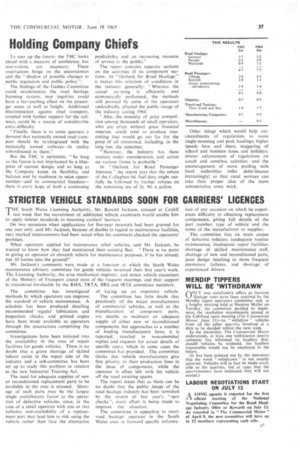Holding Company Chiefs
Page 39

If you've noticed an error in this article please click here to report it so we can fix it.
To sum up the future: the 'THC looks ahead with a measure of confidence, but reservations are necessary. These reservations hinge on the uncertainties and the "shadow of possible changes in public regulation and public policy ".
The findings of the Geddes Committee could revolutionize the road haulage licensing system; new inquiries cottld have a far-reaching effect on the passenger scene as well as freight. Additional discrimination against road transport. coupled with further support for the railways, could be a source of considerable extra difficulty.
" Finally, there is in some quarters a demand that nationally owned road transport should be re-integrated with the nationally owned railways—in reality subordinated to them."
But the THC is optimistic. "So long as the future is not imprisoned by a blueprint of current design, and so long as the Company keeps its flexibility and balance and its readiness to seize opportunities—and its commercial freedom— there is every hope of both a continuing profitability and an increasing measure of service to the public."
The report contains separate sections on the, activities of its component sections. In " Outlook for Road Haulage" it makes this criticism of conditions in the industry generally: "Whereas the actual carrying is efficiently and economically performed, the methods still pursued by some of the operators undoubtedly affected the public image of the industry during 1964.
"Also, the intensity of price competition among thousands of small operators, who are often without great financial reserves, could tend to produce ratecutting that would ,go too far for the good of all concerned, including, in the long run, the customer.
" However, the industry has these matters under consideration,. and action on various fronts is probable."
In "Outlook for Road Passenger Interests the report says that the rebate of the Callaghan 6d. fuel duty might usefully be followed by further rebates on the remaining tax of 2s. 9d. a gallon. Other things which would help are: amendments of regulations to assist single-manning and peak loadings; higher speeds here and there; staggering of school and business times and holidays; stricter enforcement of regulations on coach and omnibus activities --and the encouragement of more pooling with local authorities (who debit-finance increasingly) so that rural services can take their proper slice of the more remunerative town work.




































































































































